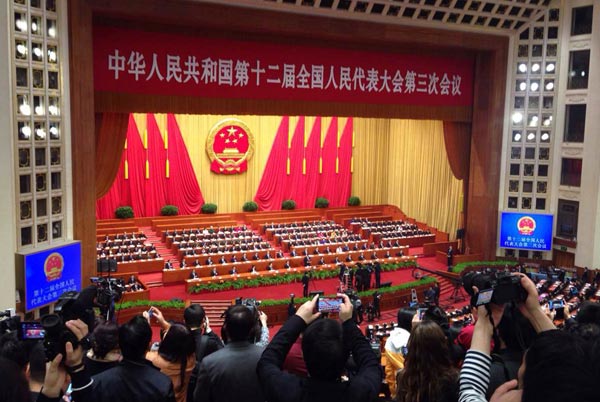 |
|
The closing meeting of the third session of the 12th National People's Congress (NPC) is held at the Great Hall of the People in Beijing, March 15, 2015. [Photo by Xu Jingxing/chinadaily.com.cn] |
BEIJING - China's national legislators adopted a revision to the Legislation Law Sunday, as the country is unfurling an ambitious legal reform.
About 3,000 deputies to the National People's Congress (NPC) overwhelmingly voted for the bill at the closing meeting of the NPC's annual session, with 2,761 in favor, 81 against and 33 abstentions.
The draft revision was tabled for the third reading at the NPC annual session after two readings last year, a rare arrangement that underlined its significance. Most bills are read and put for a vote by the NPC Standing Committee.
The Legislation Law, enacted in 2000 and considered a foundation of China's legal system, regulates how national laws, government regulations and local laws come into shape and which organizations hold the legislative power in the country.
Guo Linmao, a member of the Legislative Affairs Commission of the NPC Standing Committee, told Xinhua that the resolve of the country's leadership to advance the rule of law has led to a strong demand and heavy pressure on the legislature and its work.
"The country will need good laws and pragmatic laws, if it wants to advance the rule of law," Guo said.
Meanwhile, as new reforms are taking place in various aspects, the legislature is in urgent need of updating legislation according to the actual conditions and making sure that all reforms are legitimate.
"We have to acknowledge that the current legislative procedure has loopholes and weaknesses. For instance, we are unable to completely fend off bias and interference," he said. "We expect the revision to help solve these issues."
Delegating legislative power
The law expands legislative power from 49 cities in China to 288 nationwide, empowering their legislatures to make local laws.
Zheng Xuejun, an NPC deputy from east China's Zhejiang Province and a newspaper editor in Wenzhou city, is very excited that her city finally has the power it had lobbied for two decades.
Known for its vigorous private businesses and strong entrepreneurship tradition, Wenzhou is often on the frontline of trying bold economic reform policies.
"With the legislative power, our city can turn some of its pilot policies into more permanent arrangements and address new problems that other cities may not have," she said.
Liang Ying, with the Legislative Affairs Commission of the NPC Standing Committee, told Xinhua that the provision indicates a changing perspective toward the national and local governance.
"It is not a simple change of a statute. It shows that the central authority is delegating its power in exchange of local wisdom and vitality, in face of major economic restructuring and social reform," he said.
For a country ruled for more than 2,000 years by a powerful central authority, where even a low-level county head had once been directly appointed by the emperor at the faraway capital, the change is significant.
To prevent abuse of this power, the revised law only allows the cities to issue local laws about "rural and urban development and management, environmental protection, and preservation of historical heritage and cultural values."
It also regulates that the power should be granted step by step and the provincial legislature will decide which city is suitable.
Related Stories